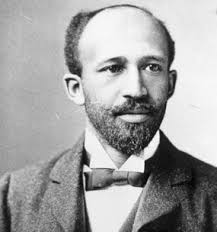Classics Series
John D. Wilsey on W.E. B. Du Bois’ The Soul of Black Folk (1903)
Du Bois, The Souls of Black Folk. Edited by Nathan Huggins (Library of America, 1986)
The Souls of Black Folk, completed in 1903 by W. E. B. Du Bois, is a profound American work of cultural assessment and critique. Lyrically written, it is piercing in its observations and wise in its prescriptions. The work strikes at the heart of racial prejudice, and its author is courageous in his critiques of the leading African American figures of the day in their failure to grasp that the problem of the color line was not a problem for the South alone or for black people alone. Du Bois’ emphasis on the humanity of black people—a foreign concept for a culture in which white supremacists did not know how to blush—is the touchstone of the work, bringing unity to the many themes he describes, argues, illustrates, and explains throughout the work. Every American—particularly now in the context of the #BlackLivesMatter movement—should sit with Dr. Du Bois and be his student in taking up and reading Souls of Black Folk.
Du Bois’ contributions in Souls are many. As a pioneering work in sociology, Souls presents new ideas that break from those put forth by Booker T. Washington, revered and respected throughout the country by whites and blacks. Du Bois called Washington “the  most distinguished Southerner since Jefferson Davis, and the one with the largest personal following” (p. 393), but leveled a stout logical, moral, and practical critique of Washington’s programme for African Americans at the turn of the twentieth century. His critique centered on three destructions wrought by Washington’s agenda, articulated in his Up From Slavery
most distinguished Southerner since Jefferson Davis, and the one with the largest personal following” (p. 393), but leveled a stout logical, moral, and practical critique of Washington’s programme for African Americans at the turn of the twentieth century. His critique centered on three destructions wrought by Washington’s agenda, articulated in his Up From Slavery
(1901). First, it assured their disenfranchisement; second, it encouraged the hardening of structures that guaranteed their relegation to social inferiority; and third, it resulted in the closing of liberal educational opportunities—those opportunities that underscore a person’s innate humanity—from people of color (p. 399).
Du Bois’ wrote on the humanizing effects of liberal education, arguing that the color line’s absurdity is obvious when one is immersed in Shakespeare, Balzac, Dumas, Aristotle, and Aurelius—“wed with Truth, I dwell above the Veil” (p. 438). He wrote on the complexities of religion, as it sustained the color line on the one hand, but became a vehicle used by African Americans to transcend the color line on the other. And he wrote on the economic and environmental legacies of race hatred, looking at the effects of injustice on the white and black people in Dougherty County, Georgia, as well as on the land itself, exhausted as it was by slavery, degradation, and greed.
Why is Souls a classic work? It is a classic because so much of it remains pertinent now. In the centennial year of Souls’ publication, Sandra L. Barnes noted the timelessness of Du Bois’ work. In her “Sociological Examination” of Souls, she identified Du Bois’ themes of race relations, economic inequality, disenfranchisement, African American leadership, education, and religion and demonstrated how these themes continue to be pertinent in today’s context. By interacting with the scholarship of today’s thinkers such as Cornel West, William Julius Wilson, James W. Ainsworth-Darnell, Douglas B. Downey, Andrew Billingsley, and others, Barnes drew connections between our time and Du Bois’, showing how Souls is as important today as it was when it appeared in 1903.
But perhaps not surprisingly, Souls earned mixed reviews at the time of its appearing. One of the most common critiques of Souls was that its author was not a Southerner, and could not truly understand the mind of the Southern person of color. Also, some reviewers received Du Bois’ bold critique of Washington with skepticism, partly on the basis that Washington was a Southerner and Du Bois a New Englander. The New York Times said on April 25, 1903 that Du Bois “probably does not understand his own people in their natural state as does [Washington]; certainly he cannot understand the Southern whites’ point of view as the principal of Tuskegee does.” A review appearing in the American Monthly Review of Reviews in August 1903 surmised that Du Bois, as a man of refined New England culture, struggled to “overcome the sensitiveness natural to a man of fine feelings” and that he was guilty of assessing “the aspirations of his people through his own individual strivings and experiences.” Thus, Du Bois’ “essays cannot be regarded as of equal value with the widely published lectures and addresses of Mr. Washington.”
And Alfred Holt Stone of the Publications of the Southern History Association wrote in September 1903 that Souls was “a distinct disappointment” and questioned Du Bois’ “wisdom of taking issue with Principal Washington’s course.” Interestingly—and also not surprisingly—foreign outlets such as the Canadian journal Methodist Magazine and Review and the Australian Sydney Mail admired the work, and provided positive reviews.
Du Bois’ Souls appeared at an interesting time in American historiography, coming out as it did less than ten years after Plessy v. Ferguson, and in the midst of the influence of the Dunning School, which saw Reconstruction as destructive to Southern state governments and individual rights. Walter L. Fleming’s Civil War in Alabama (1905) provides an example of such an argument. Thomas Nelson Page’s infamous The Negro: The Southerner’s Problem (1905) defended lynching as a fair punishment of black people, whom Page regarded as sub-human. Souls is also situated in the same period that the African American author William Hannibal Thomas produced his The American Negro (1901). Amazingly, Thomas, who had been wounded in the Civil War, argued for the innate inferiority of black people. Du Bois attacked Thomas’ conclusions, identifying in his writing “that contempt for themselves which some Negroes still hold as a heritage of the past” (Smith, p. 26).
But Souls appeared alongside other valuable African American contributions. John Wesley Cromwell produced his essays “The Jim Crow Negro” in 1904 and his The Negro in American History (1914), a treatment of the African American experience from the seventeenth century to Reconstruction. Hubert H. Harrison joined Du Bois in criticizing Washington and briefly became a leading figure in the Socialist movement between 1911 and 1914 before rejecting it for its racism. He wrote The Negro and the Nation in 1917 and laid the foundations of the black separatist movement championed by Marcus Garvey. Du Bois joined his voice in Souls to a host of essayists, novelists, poets, lawyers, and activists. Some of these included Carter G. Woodson, founder of the Association for Study of African American Life and History; Timothy Thomas Fortune, editor of the New York Age; Arturo Alfonso Schomburg, historian of the Harlem Renaissance; John Edward Bruce, journalist and mentor to Hubert Harrison; and Charles W. Chesnutt, a novelist that Du Bois called the “dean of Negro literature” even though he was 7/8 white (“Chesnutt,” The Crisis, January 1933).
Phillip Luke Sinitiere and Edward J. Blum introduced me to the work of Du Bois. I am moved by Du Bois’ varied and constant articulations of the humanity of black people—particularly in his relating of the death of his first born son. The work is a pillar of African American literature, but I think it is appropriately styled more broadly as a work of American literature. It represents the best of American thought, seamlessly fitting into the canon of the founding documents from the Declaration of Independence to Lincoln’s Second Inaugural. It should be revered alongside these great works of humanity.
John D. Wilsey is assistant professor of history and Christian apologetics at Southwestern Baptist Theological Seminary. He is author of One Nation Under God: An Evangelical Critique of Christian America (Pickwick, 2011) and American Exceptionalism and Civil Religion: Reassessing the History of an Idea (IVP Academic, 2015).

0